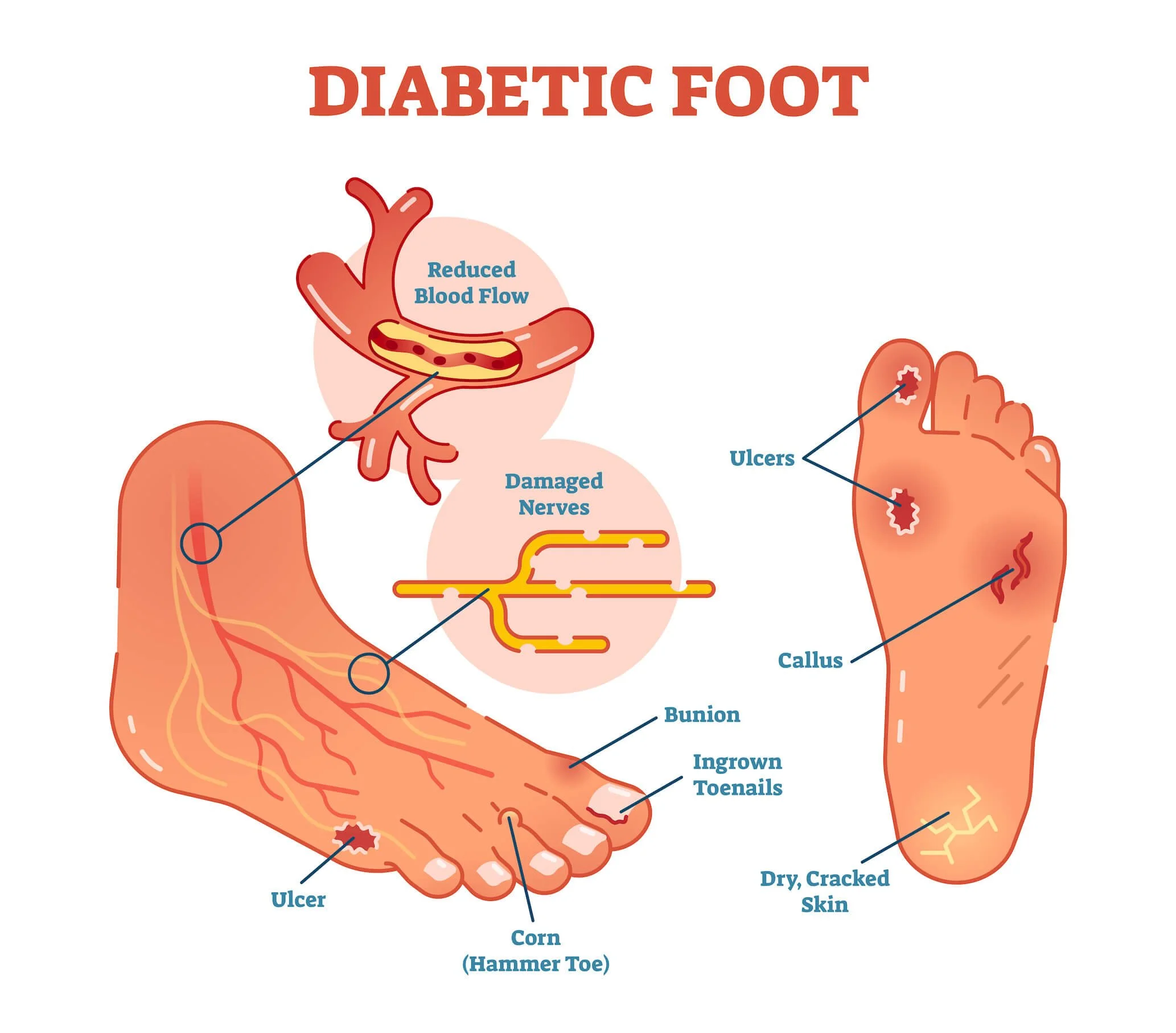
Diabetic Neuropathy
What is diabetic neuropathy?
Diabetic neuropathy is a type of nerve damage that can occur as a result of diabetes. This condition develops slowly over time as high blood sugar levels damage the nerves throughout the body.
What causes diabetic neuropathy?
High blood sugar levels
High blood sugar levels can cause a range of health problems, including one of the most common complications of diabetes known as diabetic neuropathy. When glucose levels are consistently elevated, it can damage the nerves throughout the body, leading to numbness, tingling, and even severe pain in the hands, feet, and other areas.
Long-term diabetes
Long-term diabetes has been shown to contribute to the development of diabetic neuropathy, as high blood sugar levels can damage the nerves that send signals to the brain. This damage can occur over time, and it is often irreversible.
Family history of the condition
One significant risk factor for developing diabetes is having a family history of the condition. Individuals with a family history of the disease are also more susceptible to developing diabetic neuropathy.
How is diabetic neuropathy diagnosed?
Physical exam
To diagnose this condition, healthcare professionals may perform a physical exam that includes using a Whartenberg pinwheel to assess sensitivity to touch and check for areas of numbness or weakness. This exam may also involve checking reflexes and muscle tone. In addition to the physical exam, doctors may also order nerve conduction studies or electromyography to further evaluate nerve function.
Types of diabetic neuropathy
Focal neuropathy
Focal neuropathy is a type of diabetic neuropathy that affects a specific nerve or group of nerves, often causing sudden and sometimes debilitating symptoms. Unlike other types of diabetic neuropathy, focal neuropathy usually affects only one limb or part of the body, such as the eyes or facial muscles.
Symptoms of focal neuropathy
The symptoms of focal neuropathy vary depending on the nerve affected, but pain is a common symptom that can be described as sharp, burning, or shooting in the thighs, lower back, pelvis, chest, or eyes. Other symptoms include hearing problems, double vision, and paralysis on one side of the face.
Diabetic polyneuropathy
There are two types of diabetic polyneuropathy: diabetic autonomic neuropathy and proximal neuropathy.
If left untreated, diabetic polyneuropathy can lead to further nerve damage, affecting other parts of the body, including the eyes, digestive tract, and sexual organs. Additionally, you're at risk for serious complications such as foot ulcers, infections, and amputations.
Diabetic autonomic neuropathy
Diabetic autonomic neuropathy is a nerve disorder that can affect multiple systems in the body, including the digestive tract, cardiovascular system, and urinary tract.
It occurs when high blood sugar levels damage the nerves that control these systems, leading to a range of symptoms, like constipation, dizziness upon standing, difficulty emptying the bladder, persistent nausea and vomiting, and sexual dysfunction. In men, it may be difficult to maintain an erection or reach ejaculation. In women, many notice vaginal dryness and low libido.
Proximal neuropathy
It is a rare kind of polyneuropathy seen only in 1% of type 2 diabetics. It primarily targets older adults, including those with recently diagnosed or effectively managed diabetes. The telltale sign is sharp nerve pain originating from the upper thigh, potentially extending to the hip and lower back.

How is diabetic neuropathy treated?
Controlling blood sugar levels
At our practice, our physicians work closely with patients to develop customized treatment plans that focus on managing blood sugar levels and therefore, controlling one of the underlying causes of neuropathy. We understand that keeping your glucose levels in check can be challenging, but our team is dedicated to helping you find practical strategies and tools that work for you. By doing so, we can help you not only alleviate symptoms of neuropathy but also improve your overall quality of life.
Managing pain
Our skilled physicians are equipped with a variety of tools to help manage your discomfort. From medications to topical creams, we work with each patient on an individual basis to find the best solution for their unique needs. Additionally, relaxation and stress-reducing therapies can often be highly effective in easing neuropathy pain. Through a combination of both traditional and alternative approaches, we help our patients feel more comfortable and in control of their health.
Diabetic neuropathy self-care
Prioritize foot care
It is important to take care of your feet, as this is where neuropathy can often be most severe. Check your feet daily for any cuts or sores, and wear comfortable shoes that fit well.
Follow your diet and lifestyle regimen
Managing blood sugar levels is also crucial for managing diabetic neuropathy. Make sure to follow your doctor's recommendations for medication and diet. Engage in regular physical activity, such as walking or swimming, to help improve blood flow and reduce symptoms. And don't forget to take care of your mental health, too. Stress can worsen neuropathy symptoms, so make sure to take time for relaxation and self-care practices.



